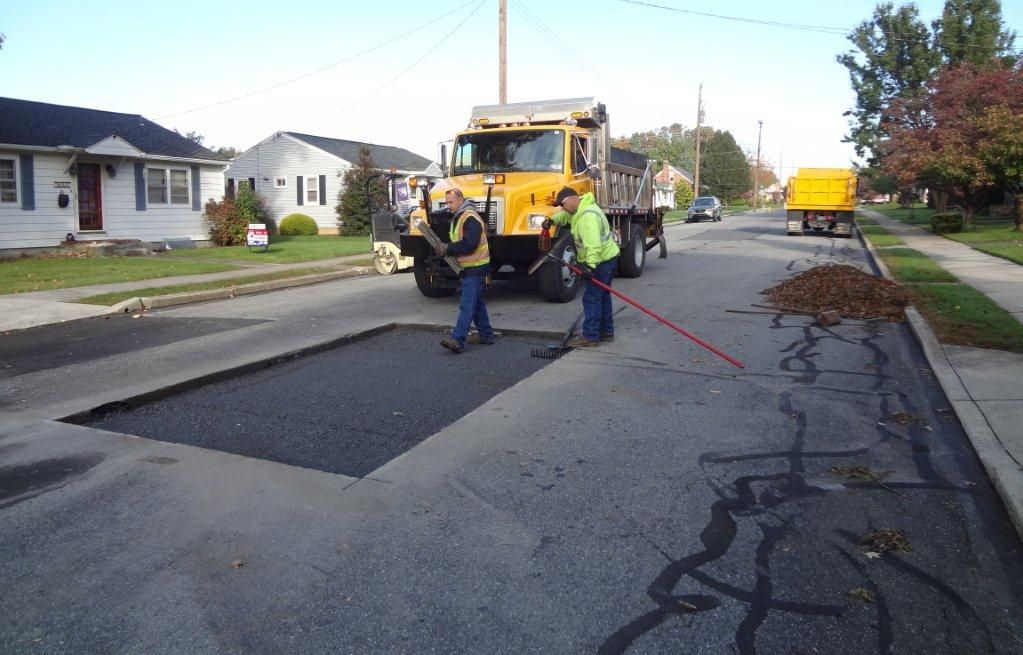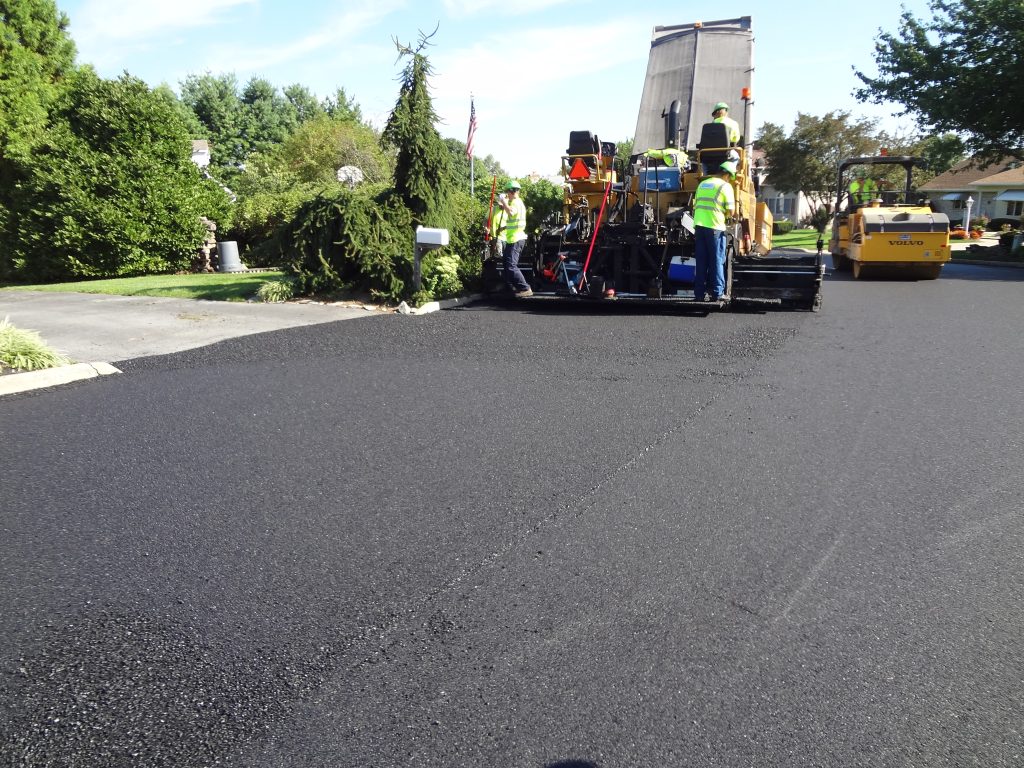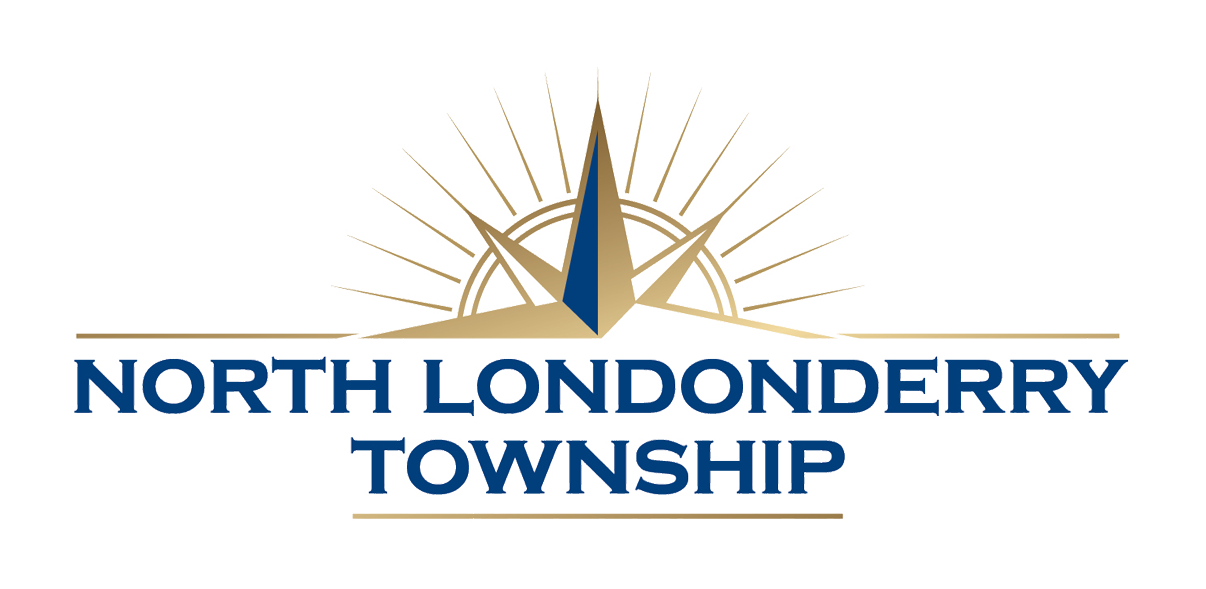Road Maintenance
Roadway maintenance is a continually improving aspect of our township. A newly paved road looks “good” for a time, but after a few years, weather and sunlight leads to roadway changes and deterioration.
Navigate this page via search or the table of contents.
Annual Seal & Patch Programs (Spring & Fall)

Crews make their way around all Township roads during the spring and fall to seal cracks and repair any broken areas of the roadway. Crews clean out the cracks with high-pressure air then apply a hot-pour sealant. When sealing an area where immediate traffic will occur, crews will spray a release agent on the sealant to prevent it from sticking to passing vehicles.
They will also patch areas in the roadway that have collapsed or broken apart before they become potholes. Our crews do not just fill these holes, they cut out a section of the road, excavate, replace and seal the asphalt creating a lasting patch on the roadway. Crews crack seal where cuts and repairs were made to bond two areas together.
Resurfacing
After the annual inspection of all Township roads, we consider the current condition of the roadway, volume of traffic, cost of paving, and available funds, to determine which will receive a resurface treatment. Although hot mix asphalt is the preferred method of preservation, it is also the most expensive and some roadways may need surface treatment before enough funds are available for asphalt.

2025 Highway Projects:
- Eisenhower Road
- Grubb Road
Total: $454,716
Paving
Paving is a labor intensive, unpredictable project. Completion is vastly dependent upon weather and timing. Prior to paving, crews prep the roadway by raising sewer manholes and milling – removing the top layer – along driveways so that the added material keeps all features on the same level surface.
When we receive dates from the contractors, we will notify those directly affected. This includes residents, postal service, and waste haulers.
Keep in mind:
- Work can begin as early as 6:00 a.m. and continue until 8:00 p.m. Crews rarely operate over a weekend, but it has happened if conditions were not optimal during the week.
- Remove all items from the roadway. This includes vehicles, trash cans, nets, and tree limbs hanging lower than 14 feet above the road.
- Driveway access could be restricted briefly.
- Asphalt will take weeks to fully cure. Turning your wheels while your vehicle is not in motion can cause grooves and rippling on the new surface.
- Crews will be back to seal between the curb and roadway. During this time, parking will be restricted once more.
You can find project details, progress, and changes in the schedule, below. We appreciate your patience and cooperation as we conduct this one in 15-20 year operation to preserve the roadway.
Microsurface
If a roadway is less than 10 years old and is structurally sound but presents numerous cracks, it would be more feasible to conduct this treatment (just as you would seal your driveway). This product is coarser then blacktop and more skid resistant. It will add some strength and ultimately extend the life of the roadway 7-10 years. While this treatment takes a few weeks to fully cure, traffic can resume within an hour of being laid.
Oil and Chip
Asphalt oil is sprayed onto the roadway then covered with small stones allowing vehicles to drive on the roadway while the oil is given time to cure. Over time, the stones disperse, revealing a smooth sealed roadway. Though it provides no added strength, it extends the life of the roadway 5-7 years.
Right of Way – Large objects in the right of way, such as, sport nets / goals, trash cans, brick mailboxes, etc. become issue working along a roadway. The owner is responsible for their objects and any damage done to Township equipment as a result of them being in the right of way.
Permits
Utility Companies and Residents: Township Code §126-25 prohibits cuts or excavations by any person for 5 years after a roadway has been constructed or resurfaced. Thus we alert utility companies of our upcoming Highway Program so that they can take appropriate measures to have new installs or repairs completed before that time. This notification also includes our projected 5 year plan.
Highway Occupancy Permit
The Township is responsible for the integrity of all dedicated roads and their rights of ways. Therefore, anyone doing work in this area, whether above or below ground, must apply for a permit from the Township prior to excavation or installation. In the event of an emergency e.g. a water main break; a permit is still required, but work may be done prior to issuance. Please contact the office at (717) 838-1373 if you need further information.
Driveway Permit
Individuals who are cutting into the roadway to establish, replace, expand or alter a driveway entrance must obtain a driveway permit. You do not need a permit for alterations where ONLY saw cutting is performed.
Sidewalk & Curb Permit
Individuals who are constructing, replacing or removing curb and/or sidewalk running parallel to the street need a permit. Exceptions are made for saw cuts only, where the roadway is not affected. Sidewalks adjoined to a home or garage i.e. not running along the roadway do not require a permit.
Contractors are responsible for establishing line and grade according to Township specifications for all new construction.
Before You Dig…Call 811
Don’t forget, you must call in your excavation location so all underground utilities can be marked to avoid damage.
Traffic Control Devices
Traffic control devices play a critical role in our daily road safety, especially for those traveling from outside the area.
Pavement Markings
Most Township roadways are unmarked. However, more heavily traveled areas require annual painting and upkeep of their markings. Street edge lines, center lines and crosswalks are typically repainted every year with a latex paint integrated with glass beads to provide reflectivity. Other street markings such as turn arrows, stop bars and in some areas, crosswalks, a thermoplastic material is laid. This material can withstand higher traffic flows and snow removal operations allowing them to be replaced every 3-5 years.
Street Signs
The Township is responsible for over 1300 signs and posts. They are inventoried and inspected every year. The Township follows Federal (Title 75, Vehicle Code & Manual on Uniform Traffic Control Devices-MUTCD) and State (Title 67, PA Code Chapter 212, Official Traffic Control Devices) codes to provide a nationwide standard for the installation and maintenance of all traffic control devices.
Whether it’s a stop sign, speed limit, or no parking sign, there must be a traffic study and Township ordinance in order to install a new sign. A desire to control speed in a problem area does not warrant the placement of a stop sign. In many cases, frequent stopping actually poses drivers to increase their speeds in order to make up that time stopped.
All signs must remain clearly visible for motorists. Property owners are responsible for keeping any vegetation clear of the sign face and post. Also, we encourage the prompt report of any damaged or vandalized sign to North Londonderry Township or the Police Department (717) 838-5276 if caught in the act.`
Traffic Signals
The Township also owns and maintains the traffic signals. An outside company inspects these signals twice a year. PennDOT manages the timing and sequence of the signals. Any changes must be warranted and approved by them.
State Route 422 is the most heavily traveled corridor in Lebanon County. Due to congestion, all traffic signals on State Route 422 from South Lingle Avenue to Center Street in Cleona were nominated to be a part of the Congested Corridor improvement Program (CCIP). The goal of this program is to reduce peak hour travel time by 20 percent. Lebanon County MPO manages Lebanon County’s CCIP.
